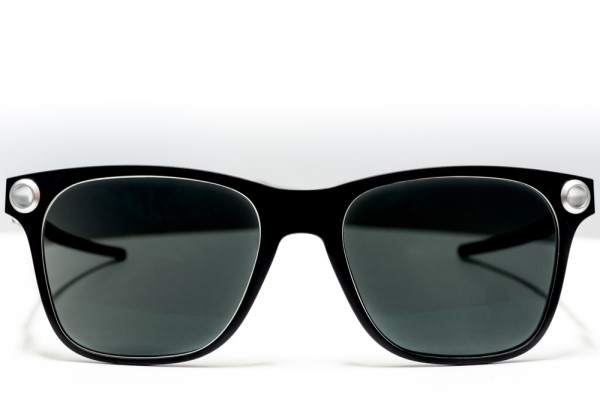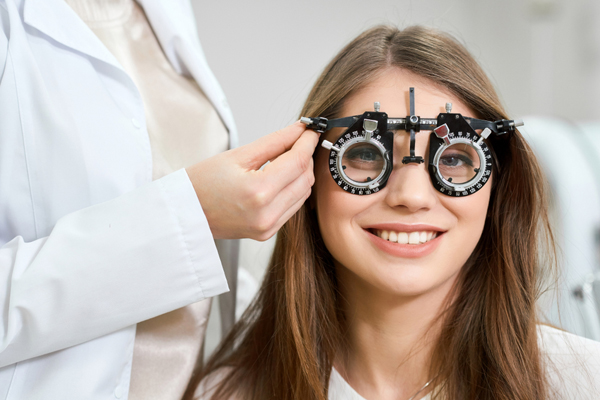Transition Lenses May Be Right for You

One aspect of wearing glasses that people are not always fond of is having to switch them out for a pair of sunglasses throughout the day; so, instead of needing two pairs of glasses, consider transition lenses. Transition lenses, also known as photochromic lenses, have the ability to brighten or darken when in contact with various levels of light. Transition lenses darken when exposed to sunlight and brighten back up when the sunlight dies down.
With technological improvements over the years, transition lenses are much more versatile and comfortable to wear. In many cases, they will not negatively hinder a patient's vision or prescriptions. This way, patients can continue to enjoy their day without needing to lug two separate pairs of glasses everywhere they go. If you are interested in transition lenses, call us and schedule an appointment.
Benefits of transition lenses
While people often remember to wear sunscreen when in the sun, they may not realize that their eyes need just as much protection. Transition lenses can protect the eyes while also helping people to drive without the sun blinding them. Along with this benefit, transition lenses also provide advantages such as:
- Being equally great for indoor and outdoor use
- Offering continuous protection from the sun's ultraviolet rays
- Patients are less likely to lose them since it eliminates the need to keep two pairs of glasses
- Saving money
- Being available in a wide variety of styles and prescriptions
A person who wears traditional prescription glasses instead of transition lenses would have to sacrifice clear vision for protection from sunlight when they put their sunglasses on. Besides that, people can purchase transition lenses instead of investing in prescription sunglasses along with a pair of prescription eyeglasses. Damaging or losing either can become a costly problem.
Selecting transition lenses
Any store-bought or online products that claim to have transition lenses are not nearly as effective as professional lenses from our practice. We will customize the lenses to the patient's needs. However, there are various factors to consider when buying transition lenses for prescription glasses.
1. Varying speed of changing brightness levels
The speed at which different brands of transition lenses change color varies. We will discuss the characteristic of each brand with the patient to help them decide which ones they want.
2. Cold environments alter the speed
All brands of transition lenses tend to take longer to change in cold weather. This can impact the decision for some people, while others do not mind.
3. Some transition lenses may not work well in cars
The glass on windows and windshields of cars comes equipped with UV protection. This protection can prevent the transition lenses from working properly. The glass on the car blocks out the UV rays, but the bright sunlight still makes it into the wearer's eyes.
4. Proper care is the same as regular glasses
Since the transition lenses are on the original glasses the patient wears, they do not typically require extra care. The patient merely has to keep them clean and properly store them when not in use.
Frequently asked questions about transition lenses
Considering getting transition lenses? Here are answers to some commonly asked questions:
1. What are transition lenses?
Transition lenses are eyeglass lenses that darken in sunlight and return to their clear state indoors. They provide convenient, all-day protection from the sun's harmful ultraviolet (UV) rays.
2. How do transition lenses work?
The lens darkens because it contains unique photochromic molecules that change shape when exposed to UV light. The darker the glasses, the more protection they offer from the sun's UV rays.
3. Are transition lenses right for me?
If you spend time outdoors and want the convenience of sunglasses without carrying them around, transition lenses may be a good option for you. Be sure to discuss your vision needs and preferences with your eye care professional to find the best lenses for you.
4. How do I care for my transition lenses?
You should clean your transition lenses with mild soap and water and dry them with a soft cloth. Avoid using harsh chemicals or cleaners, which can damage the lens coating. You should also store your glasses in a case when not in use to protect them from scratches.
5. How long do transition lenses last?
The photochromic molecules in transition lenses will eventually degrade over time and will need to be replaced. However, transition lenses can last for several years before they need to be replaced. Be sure to consult with your eye care professional about how often you should replace your lenses.
Consider transition lenses today
Transition lenses are no longer a luxury that cost an arm and a leg. They are a sensible solution for anyone who needs prescription eyewear and is also sensitive to sunlight. These lenses do not just enhance one's vision, they help to prevent it from getting worse by blocking harmful UV rays. Call us to learn more about transition lenses and schedule an appointment today.
Request an appointment here: https://brighteyesmv.com or call Bright Eyes Optometry at (914) 668-1429 for an appointment in our Mt Vernon office.
Check out what others are saying about our services on Yelp: Read our Yelp reviews.
Recent Posts
Emergency eye care is needed if you find yourself dealing with a problem with your eye that causes pain or affects your vision. Failing to treat eye injuries as soon as they are detected can lead to permanent consequences, like reduced vision or blindness. Common eye injuries that require emergency eye care include: Exposure to…
Looking for more information on eye protection? An ophthalmologist knows everything there is to know about protecting the eyes. While there are a few different types of eye care professionals, ophthalmologists are eye care professionals who have undergone additional years of education and training so they can offer their patients both medical and surgical eye…
Controlling myopia at an early age can slow down its progression. This can help prevent yearly upgrades for stronger glasses. Your optometrist can help by offering various treatments. If you want to find out how your optometrist can help control myopia, here are the details.Optometrists use atropine eye drops to achieve short-term myopia control results.…
Another word for an itchy eye is ocular pruritis. It is a common health situation in many people. Itchiness in your eyes is more than enough reason to see an optometrist. Receiving prompt treatment is important in receiving prompt relief. If you want to know what causes an itchy eye and the treatments for it,…



